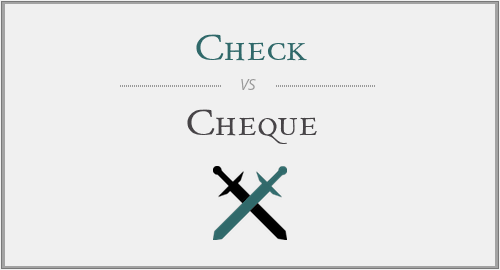The fact that you see words spelled very similarly and used with the same meaning often can be overwhelming, especially if you are not sure whether both of them are correct. The same applies to "check" and "cheque", which are often confusing or used in various contexts, making you doubt their correctitude.
Let's establish if these spellings are correct and what each represents, using the explanations below!
Check vs. Cheque
In this case, the similarity between "check" and "cheque" is not a random one. Actually, in certain conditions, these words do mean the same and can replace each other. But not in any context.
Even though "check" can replace "cheque" in any context, "cheque" won't be appropriate in every context where "check" can be used. More exactly, "check" is a more complex word, having more meanings and significations than "cheque". Consequently, "check" can also be used in more cases than "cheque". This makes it important that you understand the difference between them, as well as the situations when you should use each.
When do we use "check"?
"Check" has plenty of meanings and is one of the most usual English words. To keep it short, anyway, "check" can be used as a verb and as a noun. As a noun, it is defined as the US spelling for "cheque", referring to a piece of paper used to pay, usually printed by banks. In addition, "check" also has a few other meanings as a noun, which we'll illustrate below, using relevant examples.
Unlike "cheque", "check" is also used as a verb. From this perspective, the word has plenty of meanings, itself or within various expressions, starting from the primary definition of the action of examining something to confirm it's correct or complete. But let's exemplify them so you understand better:
Example 1: I prefer to pay by check. - as a noun, "check" is the US spelling for "cheque", a piece of paper printed by a bank, used for payments.
Example 2: I made a safety check on your equipment and I can assure you of its optimum functionality. - as a noun, "check" can also refer to an examination of something, made to confirm it's the way it should be.
Example 3: Client service in this restaurant is horrible, I asked for the check and waited half an hour to get it. - "check" is the US noun for the UK "bill".
Example 4: Put a check on that list, we have bought all the items from it. - nonetheless, as a noun, "check" can also be the US synonym for the UK "tick".
Example 5: Please check the door, I don't know if I locked it or not. - getting to "check" used as a verb, its primary meaning is the action of examining something.
Example 6: Please check if he has discovered the truth. - "check" can be replaced, in this context, with "find out".
Example 7: Check with your husband if you are coming to the party. - "check" can also refer to the action of asking or asking permission
Example 8: We need to do something to check these news from spreading. - "check" can be used with the meaning of stopping or leaving.
Example 9: You can check all the items on the list, we have purchased them all. - nonetheless, as a verb, "check" can be the US replacement for the UK "tick".
Apart from all these situations, there are several more contexts where "check" can be used with multiple meanings as a verb, but where it can never be replaced with "cheque". These include "check in", "check out", "check something off" etc.
When do we use "cheque"?
"Cheque" should always and only be used as a noun. In addition to this, it is recommended that you only use "cheque" in British English, as it is defined as the UK spelling for "check". Besides these simple rules, there is not anything else you should remember about "cheque". It simply refers to the piece of paper that a bank prints and which allows you to pay for things.
Example: I would like to pay by cheque for your services. - a piece of paper printed by a bank and used to make payments.
Conclusion
Not confusing "check" and "cheque" is very easy if you keep in mind that "cheque" has a restricted area of use. It only refers to a piece of paper and can only be used as a noun. Its US spelling, anyway, is "check". This one, besides the basic meaning, has several more significations as a noun and even more as a verb.





Have a discussion about this article with the community:
Report Comment
We're doing our best to make sure our content is useful, accurate and safe.
If by any chance you spot an inappropriate comment while navigating through our website please use this form to let us know, and we'll take care of it shortly.
Attachment
You need to be logged in to favorite.
Log In